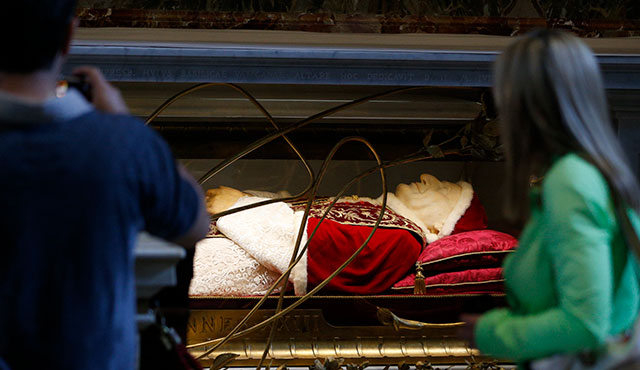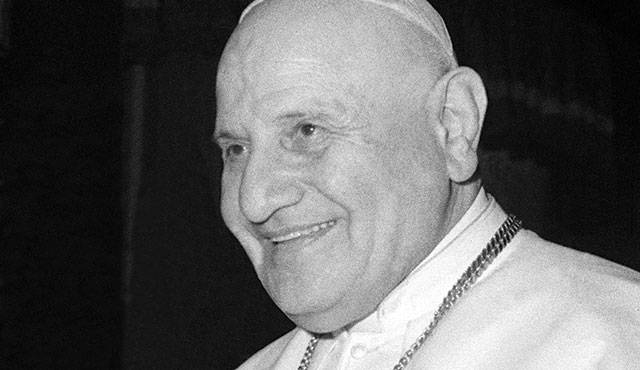The U.S. Conference of Catholic Bishops defines saints as “the members of the Church who have arrived at perfect union with Christ, [and] join their wills to the will of God in praying for those in the Church who are still on their pilgrimage of faith.”
We understand the saints have a special place in the Body of Christ. We ask them to intercede for our needs and know that they pray for us.
Yet while we may recognize the feast day of our name saint or our confirmation saint, few of us strive to be saint-like in our daily lives and even fewer of us have an ongoing devotion to the saints or a particular saint. Considering the lessons the saints teach us, that’s unfortunate.
Episcopal Vicar for Divine Worship Msgr. Arthur A. Holquin notes that saints are the faithful who lived with integrity and have reached the fullness of life with all the holy ones in heaven.
“They persevered through the inevitable challenges of life, keeping their eyes on Jesus, to live as best they could, amid the weakness and compromises that are part of our human experience, the life of Jesus,” Msgr. Holquin says.
Non-Catholics sometimes are puzzled about why Catholics pray to the saints.
“While every Christian can indeed pray directly to the Father, through Christ, we also have other intercessors before the Lord, and those are our brothers and sisters who now experience the glory of eternal life with the Lord in heaven,” he explains. “And so, we ‘pray’ to the saints so that with them, we can lift up our minds and hearts in thanksgiving, adoration and petition to our heavenly Father.”
How can Catholics strive for saintliness? “It may sound terribly simplistic but the key to holiness is to ‘do good and avoid evil,’” advises Msgr. Holquin. “However, that takes the ‘courage to be a Christian’ daily. As Catholics it is living our sacramental way of life that feeds that courage to be saints.
“We also are called to be people of God’s word,” he adds. “The scriptures narrate for us stories of how our ancestors in the faith strove to live up to God’s loving covenant with us.”
Msgr. Holquin notes that the Church has a rich history of saints who can inspire us.
“For me, St. Joseph, the husband of Mary, has always been a silent witness (Scripture records no words of his) to faithfulness in living out our relationship to the Lord,” he says. “St. Theresa of Calcutta inspires me to see Christ in all people, but especially the poorest of the poor and the sick and dying. St. Romero of El Salvador inspires me to see what courage it takes to speak truth to power and the willingness to preach what people need to hear rather than what they want to hear.”
One recently canonized saint reminds Msgr. Holquin to remain positive. “Pope St. John XXIII inspires me to believe that the Church is always in a process of reform and renewal and to be a prophetic witness to hope rather than to doom and gloom!”
Knowing that the saints provide excellent role models, parents can teach their children to celebrate their patron saints by determining when their feast day is celebrated and sharing what the saints accomplished in their lives, recommends “Practicing Your Catholic Faith as a Family,” a 2012 booklet published by the Holy Spirit Catholic Church in Huntsville, Ala.
“For example, my son’s name is Justin,” the writer notes. “When I Google “Saint Justin,” I find out that his feast day is on June 1. I also learn that Saint Justin is considered the greatest Catholic Apologist of the first century.
“Saint Justin wrote several apologies to the Roman Emperor defending the Catholic Faith. We learn from his apologies that the Catholic Church believed that the bread and wine really and truly become the Body, Blood, Soul, and Divinity of Jesus at every Mass even back in the year 150 A.D.”
Every June 1, the writer says, Justin chooses his favorite meal for dinner. At dinner, the family discusses why Saint Justin is great. His parents encourage Justin to cultivate a special devotion to his name saint and explain that Saint Justin will watch over him.
Feast days can be commemorated with gifts, such as books about the saint, medals, or rosaries. For a list of patron saints by cause and by name, visit catholic.org.
Learning more about the saints, their lives, and devotions has value for every member of the family.
“Besides what the saints can do for us by their prayers, the very practice of venerating the saints does great good for those who are devoted to the saints,” says the USCCB’s Popular Devotional Practices. “By practicing love of the saints, we strengthen the unity of the entire Body of Christ in the Spirit. This in turn brings us all closer to Christ.”


